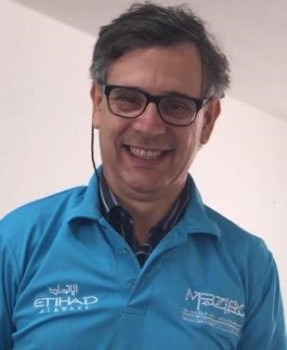Keynote Speakers

Anibal Ollero (University of Sevilla, Spain)
Aerial Robotic Manipulation and its Application to Inspection and Maintenance
Abstract
This presentation will deal with new methods and technologies on aerial robotic manipulation developed mainly in the FP7 ARCAS and the H2020 AEROARMS projects. New aerial robotic manipulators with one and two arms will be presented. The interest of compliance will be pointed out as well as the consideration of aerodynamic effects. The talk will also introduce some perception and panning capabilities of the aerial robotic manipulation system. The last part of the presentation will be devoted to the application to inspection and maintenance, including industrial plants and infrastructures.
Biography
Full Professor Univ. Sevilla, head of the GRVC Group and Scientific Advisor of the Centre for Advanced Aerospace Technologies also in Seville. He was professor of Univ. Santiago (ETSII Vigo) and Malaga in Spain and researcher at the Robotics Institute, Carnegie Mellon University (USA), and LAAS-CNRS (France). He is author of more than 660 publications, including more than 160 SCI papers and 10 books. He has been leader or participant in 160 projects, including more than 27 European Framework Programme projects, being coordinator of 5 of them, and is currently the coordinator of the H2020 AEROARMS project on aerial robotic manipulation and its application to inspection and maintenance. He is also leading the GRVC-CATEC team, one of the two finalists of the EUROC Challenge 3. He has been the advisor of 36 PhD theses. He obtained 18 international and national awards including the second EUROP-EURON 2010 technology transfer award, several best paper awards in conferences and in 2017 the First EU Drone Award (Best drone based application) and the European Commission ICT Innovation Radar 2017 Overall Winner Prize to the aerial robotic manipulators for contact inspection. He has led the development of very innovative technologies that have been transferred to many companies including AIRBUS Group, Navantia and many others. He delivered 109 plenaries and keynote presentations in International Symposia, Conferences and Workshops. Professor Ollero is currently member of the euRobotics Board of Directors and coordinator of the Aerial Robotics Topic Group and co-chair of the IEEE Technical Committee on Aerial Robotics and Unmanned Aerial Vehicles.

Jorge Dias (Khalifa University, Abu Dhabi, UAE)
Mobilizing Human Talent by Competitions and Challenge Prizes - The MBZIRC Case
Abstract
Competitions and challenge prizes have a long history as a high-impact tool for mobilizing human talent to find new solutions to societal problems and major technological achievements. In the robotics community, as in many other scientific and technological domains, there has been a significant growth in the number of challenge prizes and competitions launched in recent years. The aim is to stimulate innovation more effectively, to meet a defined challenge, and to provide solutions to the problems that matter to roboticists and society.
In this talk the objectives and major achievements from an international robotics challenge MBZIRC (Mohamed Bin Zayed International Robotics Challenge) is summarized.
The Mohamed Bin Zayed International Robotics Challenge (MBZIRC) is an international robotics competition, to be held every two years with total prize and team sponsorship of USD 5 Million. Robotics has the potential to have an impact that is as transformative as the internet, with robotics technology poised to fuel a broad range of next-generation products and applications in a diverse array of fields. Robotic competitions in the past few decades have been a catalyst that has accelerated the rate of technological advancements in the field of robotics and autonomous systems. MBZIRC aims to provide an ambitious, science-based, and technologically demanding set of challenges in Robotics, open to a large number of international teams. It is intended to demonstrate the current state of the art in robotics in terms of scientific and technological accomplishments, and to inspire the future of robotics.
Similar to other major competitions, the MBZIRC aims to provide an environment that harbors innovation and technical excellence, while encouraging spectacular performance with robotics technologies.
Biography
Jorge Dias has an Habilitation degree and a Ph.D. degree on Electrical Engineering by the University of Coimbra, Portugal, specialization in Control and Instrumentation. Jorge Dias research is in the area of Computer Vision and Robotics and has contributions on the field since 1984. He has several publications in international journals, books, and conferences. Jorge Dias was been principal investigator from several research projects. Jorge Dias published several articles in the area of Computer Vision and Robotics that include more 80 publications in international journals, 1 published book, 15 books chapters, and 279 articles in international conferences with referee. The research activities of Jorge Dias have been concentrated in the Artificial Perception Laboratory from Instituto of Systems and Robotics. Jorge Dias’s coordination leveraged the Laboratory to be involved in over a dozen international cooperation projects, CyberMove - Cybernetic Transportation Systems for the Cities of Tomorrow (EC-RTD Project, EVK4 – 2001), VISOR - Visual Perception System for a Social Robot (EURON-European Robotics Research Network) , IRPS - Intelligent Robotic Porter System (EU-IRPS FP6-IST-45048) , BACS - Bayesian Approach to Cognitive Systems (FP6-IST-027140), PROMETHEUS - Prediction and interpretation of human behaviour based on probabilistic structures and heterogeneous sensors (FP7 - 214901) and HANDLE - Developmental pathway towards autonomy and dexterity in robot in-hand manipulation (FP7-2008– 231640), Social Robot (FP7 Marie Curie - 285870) and in over 25 national projects: CHOPIN - Cooperation between Human and rObotic teams in catastroPhic Incidents, TICE Mobilidade, TICE Healthy, DIVA – Instrumented Airship for Aerial Surveilling. Since July 2011, Jorge Dias is on leave of absence to setup the Robotics Institute and research activities on robotics at Khalifa University (Abu Dhabi, UAE). He has been acting as a Professor of ECE/Robotics at Khalifa University of Science and Technology, Abu Dhabi.
